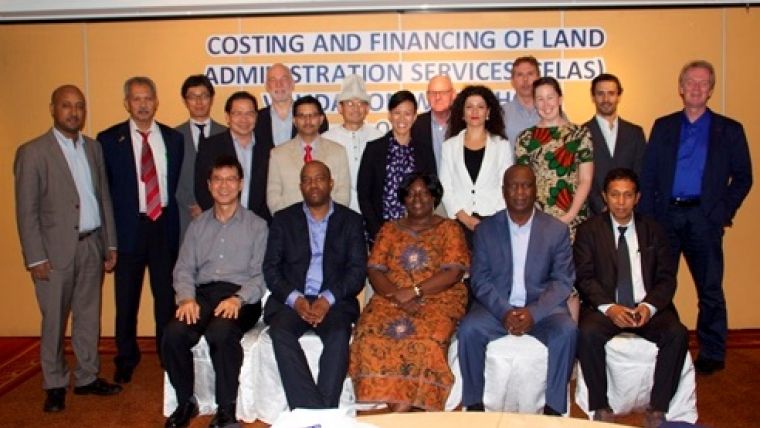Review of FIG-GLTN Workshops in Bangkok
FIG is one of the partners in the UN-HABITAT/Global Land Tool Network (GLTN). This alliance contributes to poverty alleviation through land reform, improved land management and security of tenure – particularly through the development and dissemination of pro-poor and gender-sensitive land tools. Tool development is related to reviews and evaluations by land professionals and potential users of the tools, which is why GLTN organised workshops in Bangkok, Thailand, in October 2014.
A tool on valuation of unregistered land was evaluated and a tool on land agencies budgetary approach was validated. There was also a workshop on a strategy for country-level implementations of UN-Habitat’s Continuum of Land Rights Approach and the Social Tenure Domain Model.
Land agencies’ budgetary approach
The first workshop was convened jointly by GLTN and FIG. Costing and Financing of Land Administration Services (CoFLAS) focuses on the cost of developing and maintaining a land administration system. A key initiative that underpins the approach adopted in developing CoFLAS is the concept of the ‘fit-for-purpose’ land administration approach. CoFLAS was developed to assist policymakers and those responsible for land administration in adopting appropriate technologies and methodologies that will provide and sustain land administration services more efficiently, cost effectively and with options most appropriately tailored for incorporating all tenure types. The experts provided observations and some considerations, and they validated the tool.
Valuation of Unregistered Land and Properties
The second workshop was again a joint FIG and GLTN initiative. There is general consensus that about 70% of land ownership units in developing countries are not formally registered and that the land registration initiatives are not achieving the desired results. This adversely affects owners of unregistered land and properties who, in most cases, are the disadvantaged groups that could not access valuation services. The key objective of this initiative is the development of a land tool to support the valuation of unregistered land and properties that can benefit the vulnerable and marginalised groups.
The expert Group Meeting:
- discussed the coverage of current thinking and methodologies for the valuation of unregistered land based on current standards, practices and research
- reviewed the background discussion paper, debated and commented, all to ensure that the background discussion paper addresses the intended purpose
- provided a forum for the experts present to understand and creatively contribute towards the development of a concept and to conceptualise a framework for the valuation of unregistered land and properties.
This approach should also be underpinned by the fit-for-purpose concept (FIG/World Bank, 2014). In the coming months, GLTN will conclude this phase of the initiative and will be strategising how to take this tool-development process forward.
Continuum of Land Rights and STDM
The third workshop was organised by the Dutch Kadaster and GLTN. It discussed a strategy for country-level implementation of UN-Habitat’s Continuum of Land Rights Approach and the Social Tenure Domain Model. A concept has been introduced for flexible implementation of the continuum of land rights combined with a continuum of spatial units (accuracy), parties and recordation methods related to the land administration goals.

Value staying current with geomatics?
Stay on the map with our expertly curated newsletters.
We provide educational insights, industry updates, and inspiring stories to help you learn, grow, and reach your full potential in your field. Don't miss out - subscribe today and ensure you're always informed, educated, and inspired.
Choose your newsletter(s)
























